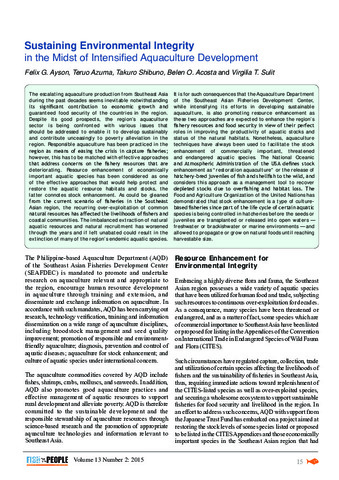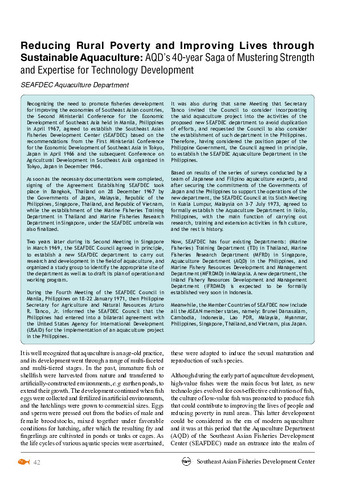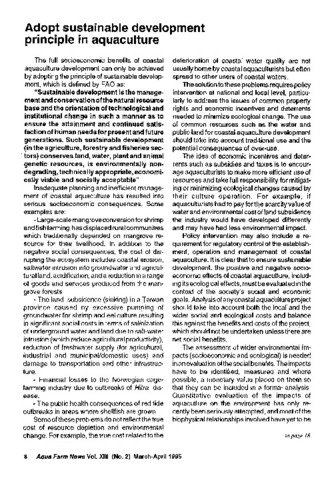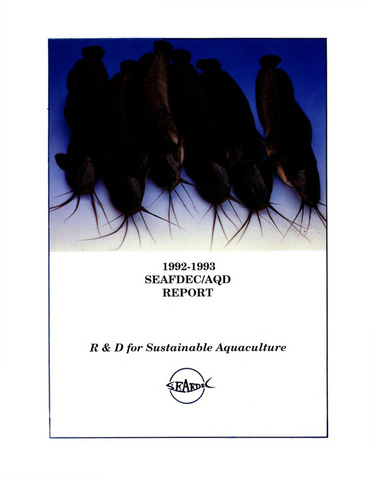Sustaining environmental integrity in the midst of intensified aquaculture development
Share
Abstract
The escalating aquaculture production from Southeast Asia during the past decades seems inevitable notwithstanding its significant contribution to economic growth and guaranteed food security of the countries in the region. Despite its good prospects, the region’s aquaculture sector is being confronted with various issues that should be addressed to enable it to develop sustainably and contribute unceasingly to poverty alleviation in the region. Responsible aquaculture has been practiced in the region as means of easing the crisis in capture fisheries; however, this has to be matched with effective approaches that address concerns on the fishery resources that are deteriorating. Resource enhancement of economically important aquatic species has been considered as one of the effective approaches that would help protect and restore the aquatic resource habitats and stocks, the latter connotes stock enhancement. As could be gleaned from the current scenario of fisheries in the Southeast Asian region, the recurring over-exploitation of common natural resources has affected the livelihoods of fishers and coastal communities. The imbalanced extraction of natural aquatic resources and natural recruitment has worsened through the years and if left unabated could result in the extinction of many of the region’s endemic aquatic species. It is for such consequences that the Aquaculture Department of the Southeast Asian Fisheries Development Center, while intensifying its efforts in developing sustainable aquaculture, is also promoting resource enhancement as these two approaches are expected to enhance the region’s fishery resources and food security in view of their perfect roles in improving the productivity of aquatic stocks and status of the natural habitats. Nonetheless, aquaculture techniques have always been used to facilitate the stock enhancement of commercially important, threatened and endangered aquatic species. The National Oceanic and Atmospheric Administration of the USA defines stock enhancement as “restoration aquaculture” or the release of hatchery-bred juveniles of fish and shellfish to the wild, and considers this approach as a management tool to recover depleted stocks due to overfishing and habitat loss. The Food and Agriculture Organization of the United Nations has demonstrated that stock enhancement is a type of culture based fisheries since part of the life cycle of certain aquatic species is being controlled in hatcheries before the seeds or juveniles are transplanted or released into open waters — freshwater or brackishwater or marine environments — and allowed to propagate or grow on natural foods until reaching harvestable size.
Suggested Citation
Ayson, F. G., Azuma, T., Shibuno, T., Acosta, B. O., & Sulit, V. T. (2015). Sustaining environmental integrity in the midst of intensified aquaculture development. Fish for the People , 13(2), 15-22. http://hdl.handle.net/20.500.12066/965
Subject
Collections
Related items
Showing items related by title, author, creator and subject.
-
Reducing rural poverty and improving lives through sustainable aquaculture: AQD's 40-year saga of mustering strength and expertise for technology development
Southeast Asian Fisheries Development Center, Aquaculture Department (Secretariat, Southeast Asian Fisheries Development Center, 2013)Recognizing the need to promote fisheries development for improving the economies of Southeast Asian countries, the Second Ministerial Conference for the Economic Development of Southeast Asia held in Manila, Philippines ... -
Adopt sustainable development principle in aquaculture
Southeast Asian Fisheries Development Center, Aquaculture Department (Aquaculture Department, Southeast Asian Fisheries Development Center, 1995)The inadequate planning and inefficient management of coastal aquaculture has resulted into serious socioeconomic consequences. These are the displacement of rural communities which traditionally depended on mangroves due ... -
R & D for sustainable aquaculture: 1992-1993 report
Sulit, Virgilia T.; Bagarinao, Teodora U.; Castaños, Milagros T.; Ebron, Nelda R.; Estenor, Demetrio G.; Huervana, Efren M.; Surtida, Augusto P.; Southeast Asian Fisheries Development Center, Aquaculture Department (Aquaculture Department, Southeast Asian Fisheries Development Center, 1994)SEAFDEC was created in 1967 to develop fishery potentials in the Southeast Asian region, and the Aquaculture Department was established in the Philippines in 1973 as part of the objectives. This report chronicles the ...





